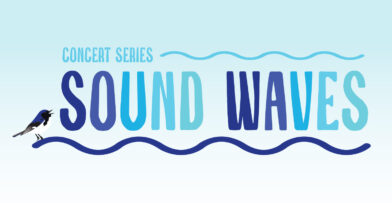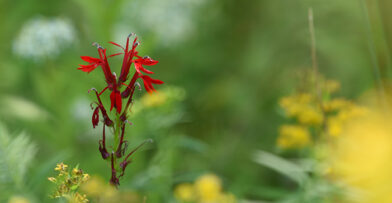In our goal to provide meaningful nature experiences for all, we’ve been converting segments of our trail system to become wheelchair accessible and ADA-friendly. In the past three years, we have grown our accessible trail network to more than two-thirds of a mile, and we’re working to reach our first full mile by fall 2019. Thanks to the generosity of a number of donors, our accessible trail system is continuing to grow!
Progress on New Accessible Trails
If you’ve visited the Center lately, you’ve likely noticed work happening on the 1,570-foot connector trail that’s been taking shape over the summer months. Extending west from the parking lot, the trail travels across the prairie to the Eagle’s Nest, past the wigwam, and ends at the entrance road. Next year, we will install a crossing at this point to connect with another forthcoming new segment that will extend all the way to the entrance booth.
When the connector trail opens this fall, it will feature crushed limestone and large sections of boardwalk to span areas currently prone to spring flooding. The woodchip trail that currently runs roughly parallel to the new segment will be closed and restored, using plants displaced by the construction of the new trail segment.
Future Accessible Trails
With the addition of the connector trail segment, we will also be one step closer to completing a loop of accessible trails that will ensure that visitors using mobility devices can access the best of our high-quality habitats to experience birds and other wildlife. Visitors will be able to travel from our entrance on East Brown Deer Road, to the Dorothy K. Vallier Environmental Learning Center, as well as explore offshoot trail segments connecting to include Mystery Pond, the Amphitheater, and the south ravine.
By mindfully making the Center more accessible, we are helping ensure that visitors of all ages and abilities can take advantage of all the Center has to offer. In addition to enhancing our physical environment, we’re intentionally cultivating partnerships that will be integral to achieving our inclusivity goals in the years to come. In 2017, for example, we debuted SPARK!, a program for people with Alzheimer’s and other forms of memory loss, and their caregivers. New potential partnerships are also being forged with groups like the Veterans Administration and Vision Forward, and we look forward to establishing relationships with these and other organizations that will allow more people immersive access to the restorative powers of nature.
Plan your visit to explore our network of accessible trails.


